Ready to explore the incredible world of epic poetry? Want to learn more about the most famous epic poems ever written?
If so, you’ve come to the right place. Here’s a list of the seven best epic poems of all time.
So, what makes an epic an epic?
An epic poem is usually a long, narrative poem that describes heroic deeds and events significant to the poet. However, these poems are much more than just that.
Epic poems of ancient times, such as Beowulf and the Epic of Gilgamesh, tell the stories of extraordinary men who fought great battles and dealt with supernatural forces to save their people.
For a good example of this, take the works of a poet like Homer—the Iliad and the Odyssey. These two poems basically laid the foundation of all Greek literature!
Among other things, they're poems that describe war, politics, love, lust, and longing for home.
What Are the Greatest Epic Poems?
Well-known epics of the Middle Ages and the Renaissance include the Divine Comedy by Dante Alighieri and Paradise Lost by John Milton.
These poems explore the inner-workings of the soul and the essence of the human condition.
The unifying factor among all these epic poems is mastery of language, an entertaining narrative, and deep insight into the shortcomings and virtues of human nature.
Many of these poems were written hundreds, if not thousands of years ago. The passage of time proves their relevance to humans of all ages.
The world of epic poetry is a deep and beautiful one. I hope this list of the best epic poems helps kickstart your exploration of that world!
PS - This list is arranged in chronological order. The oldest poem on it was written 4,000 years ago, and the “youngest” one nearly 400 years ago!
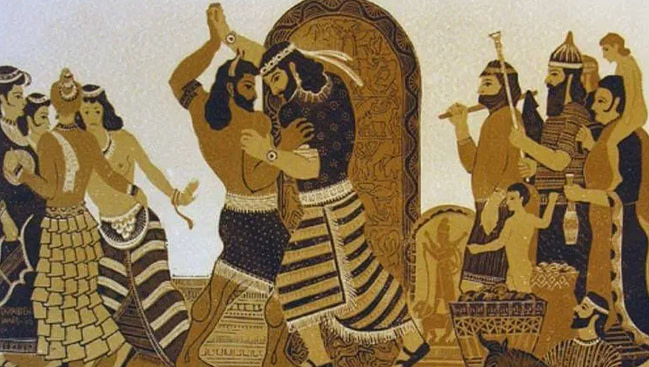
Epic of Gilgamesh
Known as the oldest work of literature in the world, the Epic of Gilgamesh originated during the time of the Sumerian civilization. That is approximately 4000 years ago!
After 600 B.C., the story of Gilgamesh was lost to history. In the mid-19th century, a copy of it was unearthed by archaeologists near the city of Mosul in Iraq. The author is unknown.
The story goes as follows: Gilgamesh is a Sumerian king who rules over Uruk. Gilgamesh is said to have ruled Uruk for around 126 years. He is described as being two-thirds god and one-third man.
As a young god-king, Gilgamesh is arrogant and his subjects are troubled by his practices and behavior. Eventually his monarchy gets challenged by Enkidu, a wildman. The gods created Enkidu to stop Gilgamesh from oppressing the people of Uruk.
The first half of the poem deals with the adventures of Gilgamesh and Enkidu. Initially, the latter challenges the former to a test of strength. Gilgamesh wins but becomes friends with Enkidu.
The two then undertake a six-day journey into a forest where they kill and slay monsters. Angered by these actions, the gods sentence Enkidu to death.
Anguished by his friend Enkidu's death, Gilgamesh decides to go on a journey in search of eternal life.
His many adventures on that journey include killing monsters, meeting gods, and even finding a man who achieved immortality.
Gilgamesh, however, fails to become immortal. His adventures result in tragedy, but not all is in vain.
At the end of his journey, Gilgamesh learns that the inevitable end of human life is death. There is no escape from it. He takes this knowledge, returns home to Uruk, and rules as a just king.
Epic of Gilgamesh deals with themes of heroism, friendship, failure, death, and the search for immortality. While not part of Western literature like the other works in this list, it’s simply too good to leave out.
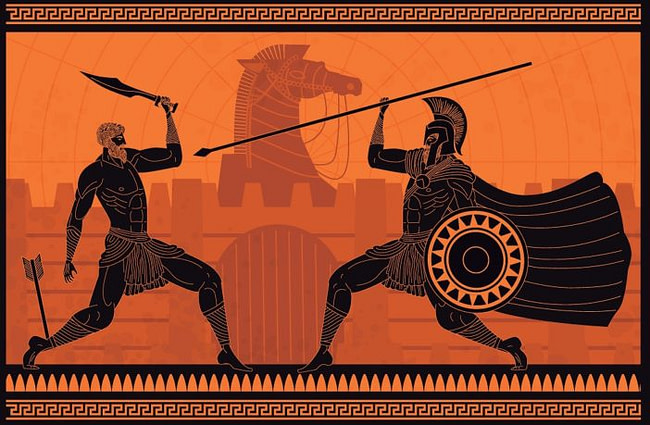
Iliad
It is the great Iliad that is responsible for two famous phrases - “Achilles’ Heel” and "Trojan horse.”
The ancient poem was written by Homer and is considered the first great epic poem of Western literature.
The Iliad is also referred to by scholars and historians as the “Song of Ilion” or “Song of Ilium.” Written sometime in the 8th century BCE, it has more than 15,000 lines of verse, which are organized into 24 books.
The reason Iliad is referred to as a “song” is because it is one!
Both the Iliad and the Odyssey were originally written in verse as a song, and meant to be performed aloud.
Unfortunately, our translations often fail to convey that.
The poem narrates the events of the Trojan War. Helen of Sparta gets abducted by Paris, the Trojan prince, and this angers the Greeks.
The Greeks, headed by Achilles, advance towards Troy to attack their enemy and destroy them. The conflict that follows is a mix of war, celebration, heroism, and mourning.
One interesting fact is that the Iliad only describes the final year of the Trojan War, and not the entire thing. It does, however, reference the many battles fought during the entire conflict.
Homer's portrayal of Olympian gods and goddesses in the literary Trojan War of the Iliad allowed him to introduce a deeper level of action into the narrative.
The epic poem wouldn’t be what it is without the presence of these deities.
Homer addresses each one of them with a name and describes their appearance and character. He describes how they watch the progress of the war and intervene when help is needed.
The gods take sides, plot and ploy, and ultimately decide the fate of the humans fighting the war.
A good reading of the Iliad brings out a bag of mixed emotions. You’ll feel the burning pain of hatred and betrayal, as well as the soaring highs of love and heroic valor.
It’s not without reason this epic poem is universally acclaimed as an absolute masterpiece.

Odyssey
Odyssey is a sequel to Homer's Iliad and revolves around Odysseus, the King of Ithaca. Odysseus, or Ulysses in Roman mythology, was a Greek hero who was part of the Trojan War.
This ancient Greek epic poem was written near the end of the eighth century BC. In Odyssey, Homer narrates the story of Odysseus' long journey home after the Trojan war.
In order to return home to his wife and son, Odysseus must overcome many obstacles. Even though his time away from Ithaca lasts nearly 20 years total, his wife Penelope and son Telemachus never give up on him.
The Odyssey starts with Odysseus leaving Troy to sail back to Ithaca along with his men. However, misfortune awaits him.
During the voyage, the brave men face several challenges. They battle storms, fight monsters, and even defeat one of the Cyclops.
This last deed results in Poseidon cursing Odysseus to wander the sea for ten years before returning home.
The more than 12,000 lines of this timeless epic don’t just describe the many adventures of Odysseus, but they also detail Mediterranean geography.
The Odyssey elaborates on some of the best stories from ancient Greek mythology, and adventure is found at every turn of this famous epic poem.
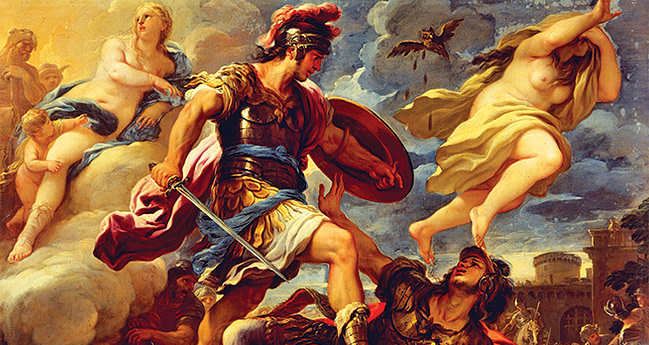
Aeneid
Written between the second and third decades BC, the Aeneid is Roman poet Virgil's claim to greatness.
It served as a huge inspiration to the medieval Italian poet Dante, whose Divine Comedy is also included in this list.
The star of the Aeneid is Aeneas, a warrior who fought in the Trojan War.
While he’s only a minor character in Homer’s Iliad, Virgil makes him the main figure in his own epic poem.
Aeneid tells the story of Aeneas's flight to Italy after the Trojan War. His wanderings from Troy to Italy make up the first half of the poem.
The remaining half focuses on Aeneas leading his men to victory on the Italian peninsula. Virgil blends Greek and Roman mythology with real historic events like the Punic Wars to explain how Aeneas became the descendant of Rome’s founders.
If you’re interested in Ancient Rome, the Aeneid is a must read. It created a mythos that Romans later used to explain their origins and divine standing in the world.
Of course, it’s also one of the all-time greatest works of Latin literature.
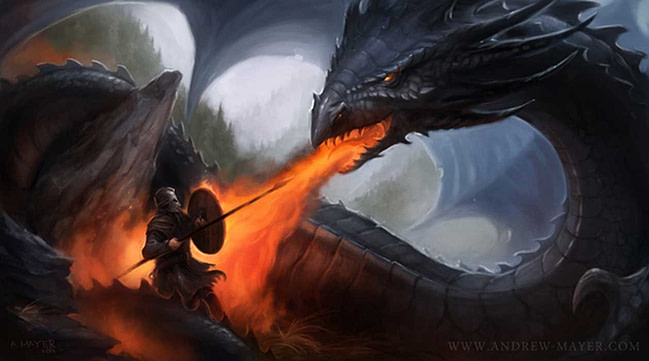
Beowulf
Written in Old English, Beowulf is the language’s most famous piece of literature.
While an exact date of composition is unknown, the poem dates back to sometime around the 8th century. The 3,183 lines of the epic describe the hero Beowulf's battles with different monsters menacing his world.
Beowulf is a young Geat warrior who learns that a demon named Grendel has been terrorizing the Danes. He then sails to Daneland to help King Hrothgar.
However, the King and his people have almost given up fighting against the monster. They are discouraged and can hardly believe Beowulf can harm it.
That evening, Beowulf valiantly fights Grendel and rips his arm off. The beast bleeds to death. King Hrothgar then praises Beowulf for his help and the people rejoice.
However, the story doesn’t stop there - more misfortune awaits. Grendel’s mother returns to avenge her son’s death and kill Beowulf’s men.
Although Grendel’s mother kills one of the men, Beowulf follows her back to her underwater lair. After an intense battle, Beowulf slays her and then returns home to Geatland.
Beowulf later becomes the King of the Geats and rules for the next 50 years.
At the end of those 50 years, a sleeping dragon awakes from its slumber and attacks the Geats. Though Beowulf is old, he defeats the dragon.
Unfortunately, the hero suffers fatal wounds and finally succumbs. He dies a tragic death, though a noble and heroic one.
Now, don’t write this off as just a poem where some Scandinavian man simply fights monsters the whole time.
Beowulf is much more than that. It’s a tail of heroism and valor, triumph and defeat. It’s an incredible glimpse into a culture that no longer exists; a culture where courage, honor, and sacrificial leadership were valued above all else.
To date, no one knows who wrote the heroic epic poem of Beowulf. Only a single copy of this ancient poem exists.
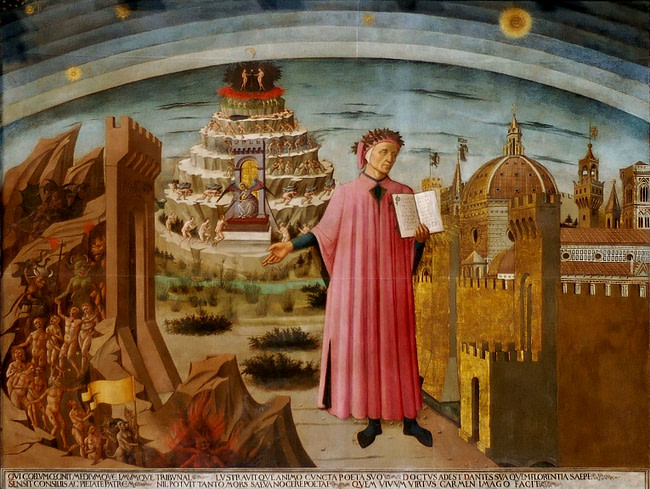
Divine Comedy
Written in the early 14th century by Italian poet Dante Alighieri, the Divine Comedy is an epic poem trilogy. Its 14,233 lines describe the journey of man through hell, purgatory, and heaven.
One of the greatest works of all European history, Divine Comedy is considered a landmark in Italian literature. In Italy, Dante is referred to as il Sommo Poeta (“the Supreme Poet”).
In the poem, Dante is led by two guides on his journey through the different stages of the afterlife.
Virgil, the Roman poet, leads him through Inferno and Purgatorio.
Beatrice, a character representing beauty, truth, and virtue, guides Dante through Heaven.
While the Divine Comedy clearly has many religious overtones, it is also incredibly political. Because of his political beliefs, Dante was exiled from his hometown of Florence.
The Supreme Poet never returned home to Florence. While writing his Comedy, he incorporated a ton of people he knew into the story. He placed the people he loved in heaven, and his political allies in hell.
When approaching this epic poem, don’t make the mistake of thinking this is simply a religious work.
The Divine Comedy is a deep exploration into questions of politics and morality, and that’s what makes it still worth reading today.
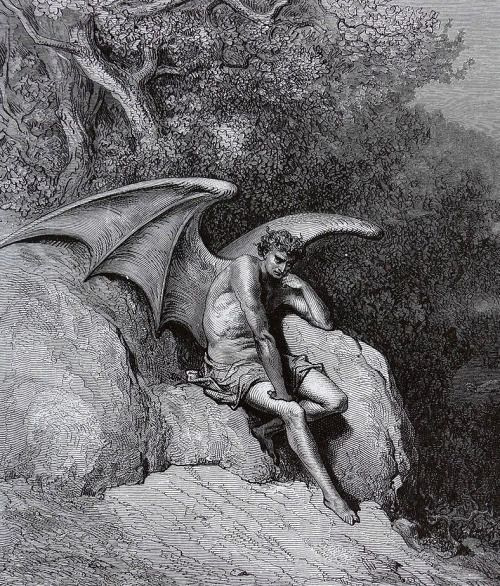
Paradise Lost
Published in 1667, Paradise Lost is considered John Milton's major work and the most famous poem in the English language.
In this epic poem, John Milton uses blank verse to narrate the Judeo-Christian story of the fall of Adam and Eve. In Milton’s words, the story was designed “to justify the ways of God to men.”
However, Milton’s depiction of Satan is the reason Paradise Lost is still read by the religious and non-religious alike.
Milton wrote part of the poem from Satan’s perspective, depicting his rebellion against the “tyranny” of God.
Many readers today find themselves more on the side of Satan. They prefer his preference to be:
Free, and to none accountable, preferring
Hard liberty before the easy yoke
Of servile Pomp.
Paradise Lost explores the inner workings of the human soul. By writing from the perspective of Satan and Adam, it has a unique approach that can inspire a diverse group of people.
A diverse group of people ranging from CS Lewis to Malcolm X has read Milton’s masterpiece and found it moving. Perhaps you will, too!
Epic Poetry: Conclusion
Trust me, this list could easily be MUCH longer. I've just limited it to these seven works in an attempt to present to you with a quick-list of the all-time best epic poems.
The world of epic poetry is certainly an exciting one. It’s filled with adventure, romance, and deep philosophical insight.
I hope this list inspires you to explore these works for yourself. Trust me, it’ll be time well spent!
-Evan
